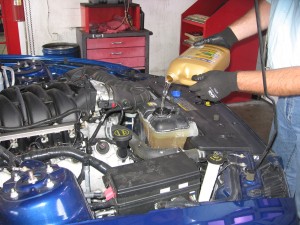Antifreeze is the colored fluid, usually red or green, found in your radiator. It can also be referred to as coolant and serves a few purposes.  The main purpose for placing antifreeze/coolant in your radiator is to keep the water that is in the engine from freezing in cold temperatures and boiling over in hot temperatures. The engine of a car produces high levels of heat when it is running, the fluids flowing through the radiator system help to draw some of the heat away from the engine so it doesn’t overheat. Antifreeze/coolant also has corrosion inhibiting chemicals that prevent rust build up that can take place in the engine of a car. Radiators are usually filled with a 50/50 mix of water and coolant, since antifreeze/coolant doesn’t evaporate like water does it keeps the levels of evaporation to a minimum. An added purpose of antifreeze is lubrication, it lubricates the moving parts it comes in contact with, like the water pump.
The main purpose for placing antifreeze/coolant in your radiator is to keep the water that is in the engine from freezing in cold temperatures and boiling over in hot temperatures. The engine of a car produces high levels of heat when it is running, the fluids flowing through the radiator system help to draw some of the heat away from the engine so it doesn’t overheat. Antifreeze/coolant also has corrosion inhibiting chemicals that prevent rust build up that can take place in the engine of a car. Radiators are usually filled with a 50/50 mix of water and coolant, since antifreeze/coolant doesn’t evaporate like water does it keeps the levels of evaporation to a minimum. An added purpose of antifreeze is lubrication, it lubricates the moving parts it comes in contact with, like the water pump.
By properly servicing your car’s cooling system, (which includes changing the antifreeze at recommended intervals), you will help to avoid major engine problems. If you wait too long to change the antifreeze/coolant, the used coolant can harm cooling system components because the corrosion inhibiting chemicals have been used up and are no longer able to do their job. The idea is to change the coolant before the corrosion inhibitors reach dangerously low levels.
For regular antifreeze the vehicle manufacturers generally recommend coolant changes every 30,000 miles or every two to three years. There are also “extended life” coolants that are designed to last 100,000 miles or five years. But be aware that these “extended life” coolants only provide extended life when used in a clean system mixed with water. If they are mixed with regular antifreeze or old antifreeze in a system, the corrosion protection is reduced to that of regular antifreeze.
If you are unsure as to whether or not the antifreeze/coolant needs to be changed you can have your service center test it to determine its condition.
